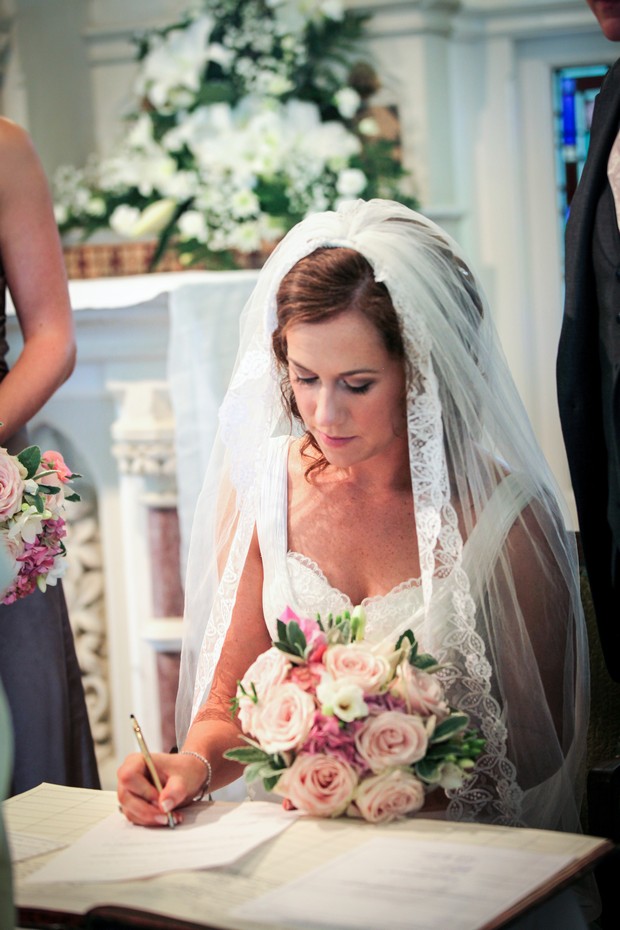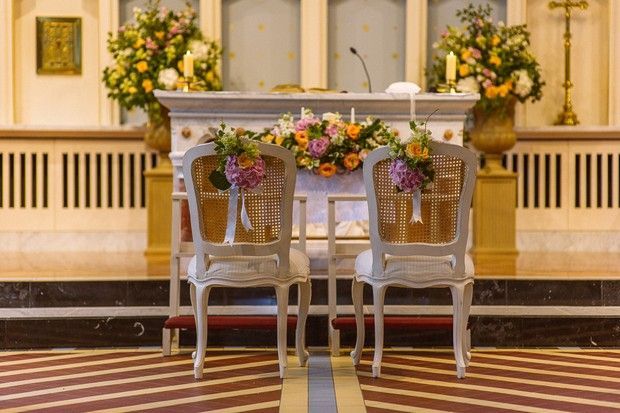Image by Shane O’Neill – Aspect Photography
It’s easy to get carried away with all the glamorous side of wedding planning – choosing bridesmaid dresses, tasting cakes and figuring out how to pretty up your venue. But there is a lot of paper work for you to get on top of, so it is best to tackle it early on. We cannot stress the importance of this more practical stuff – it may seem like an absolute headache and can be overwhelmingly confusing, but these documents and steps are essential, as they are legal requirements. Don’t forget, marriage is a legal contract so without them there will be no ceremony! Between pre-nup forms and letters of freedom, it can be hard to get your head around what in fact you need for a Church wedding so we’ve put together a little guide to help you get started…
Contact the Church You Wish to Get Married In
If you wish to have a Catholic ceremony, it must be performed within a Church and at least three months notice must be given. So first up, contact the church you wish to get married in to see if your date is available. You can opt to get married in your own local parish or another parish entirely (click here for a full list of Catholic Churches in Ireland). Before you set your heart on a Sunday wedding, check regulations with the church in question, as some will not permit weddings on a Sunday, the same applies to Holy days such as Good Friday.
Confirm Priest
Ensure you have a priest that is willing to officiate. If you are getting married outside your parish, you may have to arrange your own priest.
Fee
While there is no set rule about a fee, it is best to talk to the church in question about what form of payment is required as it can vary from church to church.
 Image by Michelle Prunty
Image by Michelle Prunty
Documents Required for a Church Wedding
A new long form of Baptismal Cert – You will need your baptismal cert which can be gotten from the parish where you were baptised. It must be issued within six months of your wedding, older certs won’t be accepted.
Indication of Confirmation – You will need a separate confirmation certificate if it isn’t recorded on your baptismal cert. This can be gotten from the church where you were confirmed and again must be issued within six months of your wedding.
Proof of Freedom to Marry – The general rule for the Letter of Freedom is that you should have a letter from each of the parishes you have lived in for more than six months since you were 18 years of age. However, this can prove difficult for some couples.
The purpose of the letter of freedom is to indicate that you are in fact free to marry, so if you are having difficulty finding your local parish, speak to the priest that is marrying you, as he will be able to advise you on alternative options.
For example, in some cases it may be acceptable for each party to ask a parent or somebody who has known them all their lives to write a letter stating their relationship to them, and that to the best of their knowledge, he/she has never been married.
Another possible option is for the person to swear an affidavit before a Commissioner of Oaths stating that he/she has never been married.
Pre-Nuptial Enquiry Form – Each person getting married in a Catholic Church must have a ‘Pre-Nuptial Enquiry Form’ (sample here) completed by the priest from their local parish (this document can be gotten from the priest). This states that you’re free to marry and that you understand the sacrament of marriage. However, if you are finding it difficult to get in touch with your local parish, again speak to the priest who is marrying you as he will be able to advise you on how to proceed (and may be happy to fill this out himself).
All other documentation (letter’s of freedom, baptismal/confirmation cert, pre-marriage course cert etc. will need to be shown to the priest when filling out the pre-nup form).
Other Documentation – If your partner is not Catholic, you will need to get a ‘Dispensation’ from the local Bishop. Contact you local priest to discuss this further.
Pre-Marriage Course – If you are getting married in a Catholic Church, you may be required to complete a pre-marriage course through the likes of Accord to obtain a certificate of completion (check with your priest regarding specific requirements).
If you have any issues or questions regarding any of these steps, it is always best to contact your local priest or parish who will be able to advise you on regulations and practices within the parish.
 Image by Nick O’ Keefe
Image by Nick O’ Keefe
The Civil Requirements:
Notification of Intention to Marry
Anyone getting married in Ireland, in a Church or elsewhere, must give a minimum of three months notification to the state of their intention to marry. This can be done by booking an appointment with your local registrar office, at least three months before your wedding date. You can find a list of Registrars offices here and can book an appointment at crsappointments.ie. You will need to bring all of the following documents with you on the day of your appointment:
- Photo ID, which must be in date: A Passport, or Refugee/Asylum card issued by the Department of Justice and Law Reform, or National ID card (from those EU countries where they are an accepted form of travel document) plus a colour photocopy (for both parties)
- Original Long Birth Cert, plus a colour photocopy (for both parties)
- Name & Date of Birth of both witnesses (must be 18 years of age or over on the date of ceremony)
- Proof of Address in the form of a utility bill (for both parties)
- PPS Number (for both parties)
You will also have to provide the following information:
- Whether it will be a civil, secular or religious ceremony
- The intended date and location of the marriage
- Name of Registered Solemniser/Priest (check national list here)
- You will be required to pay a notification fee of €200 (cash or card is accepted)
- Original final divorce decree if either of you is divorced
- Death certificate and previous marriage certificate if either of you is widowed
Once you provide all the relevant documents and answer a series of questions (which establish that you’re free to marry), the Registrar will issue you with a Marriage Registration Form (MRF – it is like a marriage license and gives authorisation for a couple to get married in Ireland). This must be signed by you both on the day of your wedding as well as your two witnesses and the priest, and then returned to the registrar you attended, no later than one month after the wedding. If the marriage doesn’t take place within six months, a new MRF will be required if you still intend to marry.
For further information, please see the following useful links:
Gnereal Register Office: www.groireland.ie


